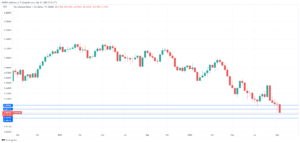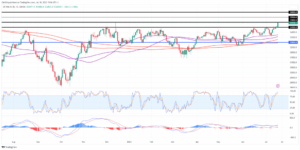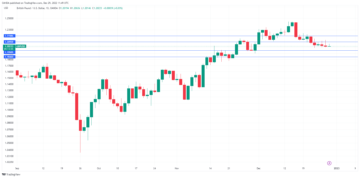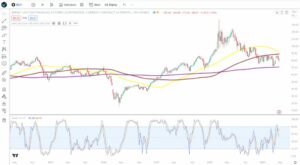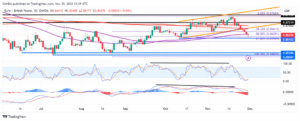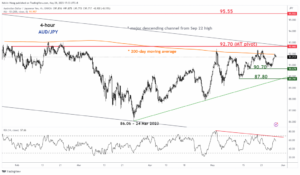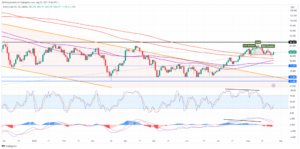Putin shakes up oil markets
Energy markets were shaken overnight as Russian President Putin directed that payments for Russian natural gas by “unfriendly nations” be paid for in roubles (RUB), giving government officials and the central bank a week to come up with a mechanism. As telegraphed yesterday, Russia also announced the full closure of the Caspian Pipeline Consortium’s Black Sea terminal because of “storm damage.”
The rouble natural gas announcement sent European gas benchmarks 30% higher on the day, while the CPC closure, through which 1.20% of the world’s crude flows, caused oil prices to spike, sending Brent crude above USD 120.00 a barrel. USD/RUB fell below 100.00 as the rouble rallied. The devil is in the detail of course, and European importers rightly point out that payment terms in supply contracts are for payment in hard currency, mostly US dollars and euros. Good luck enforcing that, however, with Russia probably likely to reply that the freezing of its currency reserves is illegal as well. As ever, the winners will be armies of lawyers.
The events in energy markets overnight were a harsh dose of reality to the world’s markets. Even if the conflict in Ukraine stopped tomorrow, the inflationary wave from commodity disruptions will not. The world has changed, and globalisation is the loser. That was enough to stop the European equity rally in its tracks as European markets tumbled. Even the perpetual dip-buyer FOMO gnomes of New York were forced to take a breath, with equities reversing their naive gains of the day before.
Oddly enough, US yields fell overnight but provided no solace for equity markets. A procession of very hawkish Fed officials continued to pour water on markets, as did negative outlooks from companies such as Adobe. Look out for more of that at the next earnings season. With the sharp rise in risk-free rates, corporate finance-speak for US government bonds, last night’s 20-year auction was extremely well supported and is the main reason long-dated yields fell. It will be interesting to see if that is just temporary. It is a microcosm that should give the still-rich pricing of many a stock food for thought. If institutional investors decide that bond yields are now attractive, and low-yielding and highly-priced stocks are not, another headwind for equities appears.
Currency markets contented themselves to watch from the sidelines overnight, with another night of choppy ranges with not much to show for it, unless, somehow, you can trade roubles. Precious metals staged an unconvincing rally that owes as much to the fall in US yields overnight, as it does to haven flows after the overnight energy developments.
US data overnight didn’t give much cause for optimism either. New Home Sales rose by less than expected, sparking a few “is this the top?” nerves, especially with the Fed governor rent-a-crowd universally now uber hawkish. The “r” for recession word is floating around more and more. Given how far behind the curve the Fed and its central bank kin have been on inflation, the cynic in me says it wouldn’t be a surprise if they made a total mess of the pivot as well. US official Crude Inventories fell by more than expected another tailwind for oil prices.
Today is Purchasing Manager Index (PMI) day across the world. Both Australian and Japan Manufacturing and Services PMIs surprised to the upside for February. It is notable that both central banks are officially still uber-dovish, although I am not sure if the Aussies will hold out for much longer. The outperformance of commodity-rich Australia was no surprise, but Japan was. As the Ukraine war drags on and potentially years of Russian sanctions ahead, I am not sure Japan will maintain the momentum.
Pan-European PMIs, notably Germany and their Prince Harry, the United Kingdom. It seems inevitable that the Ukraine war will negatively impact the Services and Manufacturing PMIs, with little fiscal wiggle room now after years of Covid stimulus, and with the disruptions being external. Given the negativity, less bad than expected data could potentially cause a relief rally in equity markets and lift the euro.
The US releases Durable Goods and Markit Manufacturing and Services PMIs today. Being partially insulated from Eastern Europe should see the February data remain robust. In contrast to Europe, the risks lie to the downside. Weak prints, combined with a hawkish Fed, will raise the stakes on the Fed-has-got-it-wrong-there-will-be-a-recession argument. That may see the US dollar fall along with US yields. You could construct a bullish or bearish argument for equities in that scenario; I’m not even going to try, although you should never count out the FOMO gnomes.
In other news from Asia, Singapore’s Prime Minister announced it is sharply reducing domestic Covid restrictions, and those for incoming travellers. Likewise, Indonesia’s President also announced an easing on international traveller restrictions and restrictions on movements and gatherings over the upcoming Ramadan. Both stock markets have risen modestly in response.
- 100
- across
- Although
- announced
- Announcement
- Another
- around
- asia
- Auction
- Australia
- Bank
- Banks
- bearish
- being
- Black
- Bonds
- Bullish
- Cause
- caused
- Central Bank
- Central Banks
- closure
- combined
- commodity
- Companies
- conflict
- contracts
- could
- Covid
- Currency
- curve
- data
- day
- detail
- developments
- DID
- Dollar
- dollars
- Earnings
- easing
- eastern
- eastern europe
- energy
- equity
- especially
- Euro
- Europe
- European
- Euros
- events
- expected
- Fed
- FOMO
- food
- full
- GAS
- Germany
- Giving
- going
- good
- goods
- Government
- Governor
- higher
- hold
- Home
- How
- HTTPS
- Illegal
- Impact
- index
- inflation
- Institutional
- institutional investors
- International
- Investors
- IT
- Japan
- Kingdom
- Lawyers
- little
- maintain
- manager
- manufacturing
- Markets
- Momentum
- more
- Natural
- Natural Gas
- New York
- news
- official
- Oil
- Other
- paid
- payment
- payments
- Pivot
- Point
- Precious Metals
- president
- pricing
- Prince
- purchasing
- raise
- rally
- Rates
- Reality
- recession
- reducing
- Releases
- relief
- response
- restrictions
- risks
- Russia
- sales
- Sanctions
- SEA
- Services
- stimulus
- stock
- Stock markets
- Stocks
- supply
- Supported
- surprise
- temporary
- Terminal
- the world
- Through
- today
- tomorrow
- top
- trade
- Uber
- Ukraine
- United
- United Kingdom
- us
- US Dollar
- us government
- USD
- war
- Watch
- Water
- Wave
- week
- winners
- world
- world’s
- years




